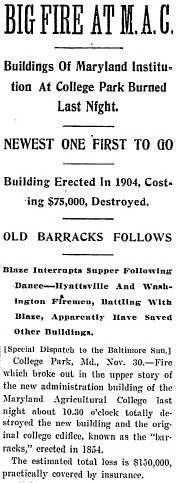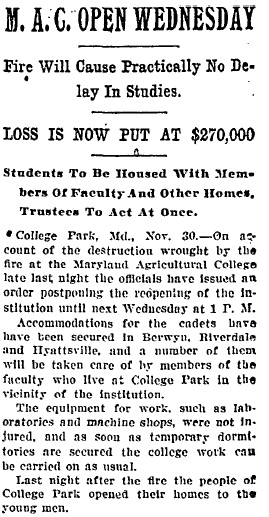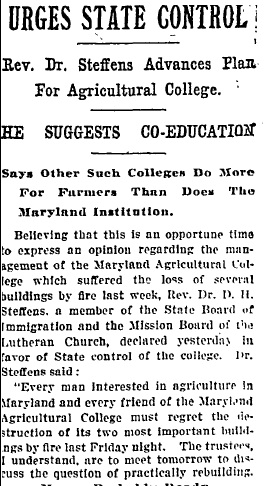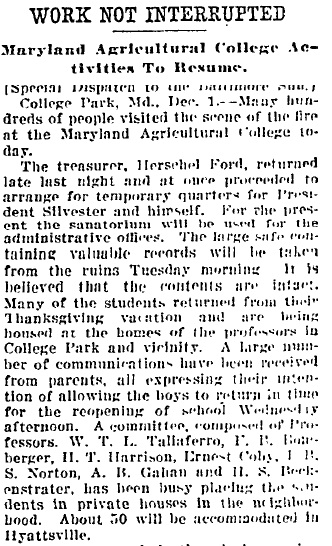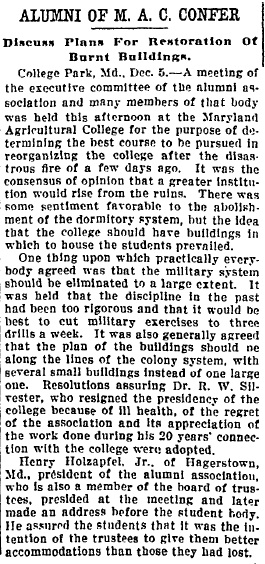Local Press
The Baltimore Sun
Click a thumbnail image to read the full transcript of each article.
BIG FIRE AT M.A.C.
Buildings Of Maryland Institution At College Park Burned Last Night.
NEWEST ONE FIRST TO GO
Building Erected in 1904, Costing $75,000, Destroyed.
OLD BARRACKS FOLLOWS
Blaze Interrupts Supper Following Dance — Hyattsville And Washington Firemen, Battling with Blaze, Apparently Have Saved Other Buildings.
[Special dispatch to The Baltimore Sun.]
College Park, Md., Nov. 30. — Fire which broke out in the upper story of the new administration building of the Maryland Agricultural College last night about 10:30 o'clock totally destroyed the new building and the original college edifice, known as the "barracks," erected in 1854.
The estimated total loss is $150,000, practically covered by insurance.
Fire Breaks Up Dance.
A dance was in progress, the guests being at supper in the mess hall of the old building. A rush was made for the doors, but a panic was averted by assurance from officials of the college that there was no danger.
The cadets helped the young ladies don their cloaks and the entire dancing party left the building as quickly as possible.
Some of the young ladies, not to be outdone by the heroism of the cadets, although they were attired in evening gowns, turned in and helped the cadets to empty the barracks of clothing and other effects.
The origin of the fire is unknown, but the blaze is presumed to have resulted from the crossing of electric wires.
Students Losers By Fire.
Owing to the holiday season many of the 250 students at the college were on vacation and these cadets lost all their clothing, books and other effects in the quarters.
Most of the valuable records in the offices of President R.W. Silvester and Treasurer Ford, in the new administration building, were saved, as well as many articles of furniture.
As soon as the fire was discovered officials and students played a stream on the fire with a small hose, but the heat and dense smoke soon drove them out of the building.
Administration Building Collapses.
The flames were not long in eating their way down through the administration building. This structure was connected with the barracks by two bridges, and the blaze quickly spread to the older building. At midnight the administration building had collapsed, and two hours later the barracks was nothing but a smoldering ruin.
Science Hall Saved.
When the fire department from Hyattsville arrived the new building was doomed, but with a new supply of water the old barracks could have been saved. The lack of water drove the firemen to the saving of adjoining buildings, and a desperate and successful fight was made to save Science Hall, located about 50 feet from the administration building.
Aid Comes From Washington.
Chief Wagner, of the District of Columbia Fire Department, was appealed to for aid, and sent two companies out from Washington. The apparatus was brought on a Baltimore and Ohio truck. The Washington firemen remained until all danger of the fire spreading had passed.
The new administration building was erected in 1904 under a special act of the Legislature and cost about $75,000, including equipment.
Under Control At 2 A.M.
At 2 o'clock this morning the Hyattsville and Washington firemen were still at work, and it was evident that the ruins would continue to blaze for some hours, but the remaining buildings of the college were apparently saved.
M.A.C. OPEN WEDNESDAY
Fire Will Cause Practically No Delay In Studies.
LOSS IS NOW PUT AT $270,000
Students To Be Housed With Members Of Faculty And Other Homes. Trustees To Act At Once.
College Park, Md., Nov. 30. — On account of the destruction wrought by the fire at Maryland Agricultural College late last night the officials have issued an order postponing the reopening of the institution until next Wednesday at 1 P.M.
Accommodations for the cadets have been secured in Berwyn, Riverdale and Hyattsville, and a number of them will be taken care of by members of the faculty who live at College Park in the vicinity of the institution.
The equipment for work, such as laboratories and machine shops, were not injured, and as soon as temporary dormitories are secured the college work can be carried on as usual.
Last night after the fire the people of College Park opened their homes to the young men.
Preparing To Rebuild.
The college and State authorities have already begun preparations for the erection of new dormitories to replace those destroyed. Mr. Charles H. Stanley, of Laurel, chairman of the executive committee of the board of trustees, was at the school today and consulted with Mr. John Hubert, president of the Second Branch of the City Council of Baltimore, who is chairman of the building committee of the board of trustees. After a somewhat lengthy conference the faculty of the college was directed to proceed as the emergency seemed to demand. This means that the trustees will arrange to pay for whatever accommodations are afforded to the cadets.
Chairman Stanley has called a meeting of the executive committee for Monday morning at 11 o'clock at the Hotel Rennert, in Baltimore, to discuss the matter, and Governor Goldsborough, as chairman of the board of trustees, has called a meeting of the entire board for Tuesday at the same place and hour. At this latter meeting a report on the fire will be made by the executive committee, which will also submit recommendations as to what steps should be taken to repair the damage.
Ready To Pay Insurance
W.D. Thomas, representing the firm of Turner & Thomas, of Baltimore, insurance agents, was at the college today and asserted that those whom he represented were ready to draw a check for $75,000, the amount of insurance placed on the buildings, as soon as the money was needed. There is no doubt that all the money required to erect new buildings will be forthcoming, especially as the State is expected to make the amount good so soon as the Legislature meets, early in January, 1914.
Prof. Thomas H. Spence and the other members of the faculty also expressed themselves as deeply appreciative of the sympathy manifested and the offers to house the cadets received from the entire neighborhood.
Total Loss $270,000.
A careful survey of the damages caused and a casting up of the value of the new administration building and the "barracks," together with the contents lost, leads the college authorities to place the total loss at $270,000. This includes the destruction of ordinance, including many rifles, furniture, and students' belongings. Very few of the 300 or more rifles were saved and all were damaged. There is an insurance of $3,000 on this property.
The large safe secured by the late Dr. Joseph R. Owens when he was treasurer of the college from the First National Bank of Hyattsville dropped into a pool of water caused by the bursting of water pipes and its contents are believed to be intact. The safe holds valuable college records kept by Treasurer Ford, but no money.
When the fire was getting the better of the fighters the students were especially active in rescuing college records, even to the extent of sacrificing their own property. It has been definitely learned that the insurance on the two burned buildings, including contents and ordinance, is about $100,000, and that the policies are held in about a dozen companies.
Praises Hyattsville Firemen.
Prof. Thomas H. Spence, vice-president of the college, today stated that the Hyattsville fire department undoubtedly saved five of the most important laboratories and lecture halls adjoining the burned building and that the engineering building would certainly have been destroyed, adding $20,000 to the loss, except for the effective action of the Hyattsville firemen.
Considerable criticism was heard last night of what was termed the inadequate facilities for fighting a fire of such size. If formal complaint is made there will undoubtedly be an investigation by a committee of the Maryland Legislature.
Clarence B. King, president of the Washington Railway and Electric Company, sent two special trolley cars to the scene of the fire to convey the Washington guests at the dance home.
URGES STATE CONTROL
Rev. Dr. Steffens Advances Plan For Agricultural College.
HE SUGGESTS CO-EDUCATION
Says Other Such Colleges Do More For Farmers Than Does the Maryland Institution.
Believing that this is an opportune time to express an opinion regarding the management of the Maryland Agricultural College which suffered the loss of several buildings by fire last week, Rev. Dr. D.H. Steffens, a member of the state board of Immigration and the Mission Board of the Lutheran Church, declared yesterday in favor of State control of the college. Dr. Steffens said:
"Every man interested in agriculture in Maryland and every friend of the Maryland Agricultural College must regret the destruction of its two more important buildings by fire last Friday night. The trustees, I understand, are to meet tomorrow to discuss the question of practically rebuilding.
Money Probably Ready.
"The opinion has been expressed that this may be safely undertaken, since the State at the next session of the Legislature would not fail to provide the necessary funds. I hope that this will be done. I may be pardoned if I express the opinion that this is a most opportune time to ask ourselves if the Maryland Agricultural College is to simply continue on its old lines, or whether it is to be reorganized in such a measure as to increase its importance and usefulness to this state.
Performs Real Service.
"Since the State is expected to defray, at least in part, the expense of rebuilding, every citizen has a right to ask this question.
"It may be true that the Maryland Agricultural College is a semi-public institution, subsidized by this State, and only partially under the control of the State. If this is correct it raises the question of the wisdom of continuing this arrangement. The largest and most efficient agricultural colleges of this country are State Institutions.
Different Elsewhere.
"While we Marylanders may pride ourselves on our having had the first agricultural college in the United States, we cannot say that this institution ranks with the agricultural colleges of Illinois, Wisconsin, Michigan and Pennsylvania.
"Indeed, the number of students at our agricultural college who are studying agriculture, horticulture and animal husbandry is lamentably small. The Agricultural Department of Pennsylvania State College has 824 students, 624 of them in its four-year courses. How many has the Maryland Agricultural College?
Girls Taught Also.
"Most of our Western agricultural colleges are co-educational. They not only train farmers but they also train farmers' wives — men and women who can work hand in hand for the uplift of their communities. What has the Maryland Agricultural College done in this direction?
"I am convinced that our State is upon the threshold of an immense agricultural development. Immigration from the Middle West, the field demonstration work of the general education fund: the most interesting experiment of Dr. Cyril [Hodgins] in lower Prince George's, where a successful effort is being made to restore worn out soil to fertility and productiveness, convince me that the time has come for us to ask ourselves if the Maryland Agricultural College is organized to do its full share in the promoting of this development?
Urges Progress.
"If not, let us ask ourselves what ought to be done? To simply replace the building destroyed by this fire with the assumption that the people of this State will foot the bill may mean the loss of such an opportunity as presented itself to Baltimore after its disastrous fire of 1904.
"I am intensely interested in the development of our southern counties and I have a fair knowledge of their agricultural conditions. I therefore hope that the State and the trustees of the college will make the most of this present opportunity and plan whatever is done along broad and progressive lines."
WORK NOT INTERRUPTED
Maryland Agricultural College Activities To Resume.
[Special dispatch to The Baltimore Sun.]
College Park, Md., Dec. 1 — Many hundreds of people visited the scene of the fire at the Maryland Agricultural College today.
The treasurer, Herschel Ford, returned late last night and at once proceeded to arrange for temporary quarters for President Silvester and himself. For the present the sanatorium will be used for the administrative offices. The large safe containing valuable records will be taken from the ruins Tuesday morning. It is believed that the contents are intact. Many of the students returned from their Thanksgiving vacation and are being housed at the homes of the professors in College Park and vicinity. A large number of communications have been received from parents, all expressing their intention of allowing the boys to return in time for the reopening of school Wednesday afternoon. A committee, composed of professors W.T.L. Taliaferro, F.B. Bomberger, H.T. Harrison, Ernest Coby, J.B.S. Norton, A.B. Gahan and H.S. Beckenstrater, has been busy placing the students in private houses in the neighborhood. About 50 will be accommodated in Hyattsville.
There was much looting during or immediately after the fire. Many of the students, who had reason to believe that their clothing and effects had been saved, returned to find that they had lost practically everything. The officials at the college state that strangers made away with the articles. These goods, for the most part, were taken from obscure parts of the premises not under patrol.
President Silvester has received many letters of condolence from heads of colleges all over the country, and offers of assistance in the way of furniture, etc., have been received from Washington and Baltimore business houses. But two of the lecture rooms out of 19 were put out of commission, these being the department of languages and mathematics. Vice President Thomas H. Spence, professor of languages, will have his lecture room in the college museum, and Prof. H.T. Harrison will utilize one of the laboratories in the mechanical engineering department for his department of mathematics.
The officials announce that the students anticipating taking the short winter course, beginning January 8, will not be disappointed, and this course will be pursued without interruption. The officials will provide for proper literary society halls in the new buildings. It is also the general impression that the main college building will not be erected on the site of the one burned, but if proper quadrangular space can be provided will be on the campus immediately in front of the old buildings.
ALUMNI OF M.A.C. CONFER
Discuss Plans For Restoration Of Burnt Buildings.
College Park, Md., Dec. 5. — A meeting of the executive committee of the alumni association and many members of that body was held this afternoon at the Maryland Agricultural College for the purpose of determining the best course to be pursued in reorganizing the college after the disastrous fire of a few days ago. It was the consensus of opinion that a greater institution would rise from the ruins. There was some sentiment favorable to the abolishment of the dormitory system, but the idea that the college should have buildings in which to house the students prevailed.
One thing upon which practically everybody agreed was that the military system should be eliminated to a large extent. It was held that the discipline in the past had been too rigorous and that it would be best to cut military exercises to three drills a week. It was also generally agreed that the plan of the buildings should be along the lines of the colony system, with several small buildings instead of one large one. Resolutions assuring Dr. R.W. Silvester, who resigned the presidency of the college because of ill health, of the regret of the association and its appreciation of the work done during his 20 years' connection with the college were adopted.
Henry Holzapfel, Jr., of Hagerstown, Md., president of the alumni association, who is also a member of the board of trustees, presided at the meeting and later made an address before the student body. He assured the students that it was the intention of the trustees to give them better accommodations than those they had lost.

